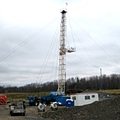- By Dan Veaner
- News
 Print
Print  The Lansing Gas Drilling Committee sent a letter this week advising the Town board to create a ban on certain heavy industries including hydrofracking. At a working meeting Wednesday board members said they want the committee to work on crafting a ban that could potentially be voted into law.
The Lansing Gas Drilling Committee sent a letter this week advising the Town board to create a ban on certain heavy industries including hydrofracking. At a working meeting Wednesday board members said they want the committee to work on crafting a ban that could potentially be voted into law."We recommend that the Town Board please include input from the new Town Planner as well as the Gas Drilling Oversight Committee regarding this matter," concluded the Drilling committee letter. "The Town Attorney should be directed to perfect language on a ban on expansion of heavy industry, which could then be approved by the Lansing Town Board."
The letter was signed by Drilling Committee members Larry Beck, Tom Butler, Karen Edelstein, Suzanne Hinderliter, William Miller and Rachel Bean, and sent to each board member plus Krogh and Lansing Planning Consultant Michael Long.
After the Drilling Committee crafts a ban the Town Board would have to vote it into law. A few heavy industries already exist in Lansing, which many residents believe have been beneficial to the township. Board members were interested in pursuing a ban, but noncommittal about whether or not they will vote for one, citing concerns about which heavy industries would be impacted.
"They say (they want to ban) heavy industry," said Councilman Doug Dake. "That bothers me."
Krogh replied that the parts of town where heavy industry is allowed and specific industrial uses will have to be clearly defined.
"If you're going to elect a ban you are going to need to decide exactly what you're going to ban," he said. "Zoning is the best backbone on which to build it. You can pass a standalone ban, but I wouldn't recommend it. I don't know what the definition of 'heavy industry' is going to be, but they want to explore that. You have to define what you're talking about. I think we can agree that Cargill has not been a bad thing in the community, but copper smelting here might not be appropriate. I don't know where they're going to draw the line."
Krogh also noted that Genoa is also contemplating a ban and said it might be worthwhile for Lansing's Drilling Committee to work with that municipality's committee. The initiatives reflect a growing push back against hydrofracking across New York State.
On Wednesday environmental and anti-fracking organizations launched the 'Not One Well' campaign at a rally in Albany. At the same time hundreds of people delivered thousands of petitions to Cuomo's office in New York City. The petitions call for Governor Cuomo to protect New York by listening to the science, resisting pressure from the oil and gas industry, and forbidding fracking. Wednesday's batch reportedly brings the cumulative total of anti-fracking petitions to more than half a million.
"The more scientists study fracking, the more we learn about the risks it poses to human health, including links to birth defects and cancer," said Kate Sinding, Senior Attorney with the Natural Resources Defense Council. "It's not surprising that polling shows the vast majority of New Yorkers—across party lines, upstate and down—support an ongoing moratorium on fracking. We're counting on Governor Cuomo to continue standing his ground, and not to cave to pressure from powerful oil and gas companies who want to frack near our families, homes and schools."
Many municipalities have held back on creating hydrofracking bans, fearing high legal expenses. But in two related decisions, the Third Appellate Division in Albany ruled that Dryden and Middlefield, in Otsego County, had the right to ban drilling in 2011 when they passed ordinances banning gas drilling. That paves the way for other municipalities to enact their own bans with reduced fear of overwhelming legal fees.
"In June 2014, a decision by the New York State Court of Appeals upheld two lower courts in New York State, affirming that it is within the jurisdiction of Towns to use land use restrictions to control the type and proper location of any activity within the Town," the Drilling Committee letter says. "The negative impact of unconventional drilling, and associated heavy industrial activity on townships has led more than 80 other New York State municipalities to implement such a ban in recent years. While such drilling has not yet commenced, the implementation of a ban on expanded heavy industry in our Town is both timely and necessary, given the issues that have emerged in the past decade.
Krogh said it would be beneficial to have one overarching Conservation Advisory Council to deal with environmental issues including drilling, water, ecological or lake. He said that because such a council is a statutory creation it would qualify the Town for grants and would involve a broad spectrum of community involvement. Board members were receptive to the idea, but said they want to give the existing Drilling Committee a chance to complete their work on a ban first.
The board unanimously agreed to fund limited time with Krogh in crafting a ban. $2,000 is included in this year's budget for the committee's use.
v10i45



